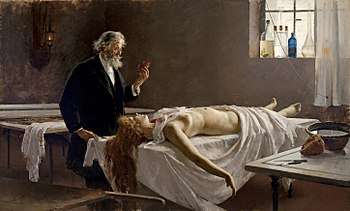Natural history of disease
The natural history of disease is the course a disease takes in individual people from its pathological onset ("inception") until its eventual resolution through complete recovery or death.[1] The inception of a disease is not a firmly defined concept.[1] The natural history of a disease is sometimes said to start at the moment of exposure to causal agents.[2] Knowledge of the natural history of disease ranks alongside causal understanding in importance for disease prevention and control. Natural history of disease is one of the major elements of descriptive epidemiology.[2]

Autopsy (1890) by Enrique Simonet.
References
- Porta, M, ed. (2014). "Natural history of disease". A Dictionary of Epidemiology (5th ed.). Oxford: Oxford University Press. pp. 193–194. ISBN 978-0-19-939005-2.
- Bhopal, RS (2008). "Interrelated concepts in the epidemiology of disease: Natural history, spectrum, iceberg, population patterns, and screening". Concepts of epidemiology: Integrating the ideas, theories, principles, and methods of epidemiology (2nd ed.). Oxford: Oxford University Press. doi:10.1093/acprof:oso/9780199543144.001.0001. ISBN 9780199543144.
This article is issued from
Wikipedia.
The text is licensed under Creative
Commons - Attribution - Sharealike.
Additional terms may apply for the media files.